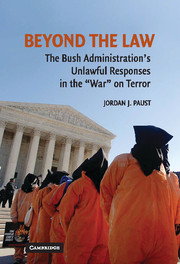Book contents
- Frontmatter
- Contents
- Preface
- Acknowledgments and Permissions
- ONE Executive Plans and Authorizations to Violate International Law Concerning Treatment and Interrogation of Detainees
- TWO Additional Revelations Concerning Treatment, Secret Detentions, and Secret Renditions
- THREE War and Enemy Status
- FOUR Judicial Power to Determine the Status and Rights of Persons Detained Without Trial
- FIVE Executive Claims to Unchecked Power
- SIX Antiterrorism Military Commissions
- Notes
- Name Index
- Subject Index
FIVE - Executive Claims to Unchecked Power
Published online by Cambridge University Press: 24 November 2009
- Frontmatter
- Contents
- Preface
- Acknowledgments and Permissions
- ONE Executive Plans and Authorizations to Violate International Law Concerning Treatment and Interrogation of Detainees
- TWO Additional Revelations Concerning Treatment, Secret Detentions, and Secret Renditions
- THREE War and Enemy Status
- FOUR Judicial Power to Determine the Status and Rights of Persons Detained Without Trial
- FIVE Executive Claims to Unchecked Power
- SIX Antiterrorism Military Commissions
- Notes
- Name Index
- Subject Index
Summary
LEGAL CONSTRAINTS ON THE COMMANDER IN CHIEF POWER
On signing the 2005 Defense Appropriations Act, President Bush stated that “[t]he executive branch shall construe Title X in Division A, relating to detainees, in a manner consistent with the constitutional authority of the President to supervise the unitary executive branch and as Commander in Chief and consistent with the constitutional limitations on the judicial power which will assist in … protecting the American people from further terrorist attacks.” Whatever implications lurk in the language of such a statement, President Bush has no delegated or inherent authority to suspend, change, or ignore the reach of duties set forth in the 2005 legislation.
First, the President is expressly and unavoidably bound by the Constitution to faithfully execute the laws, including the 2005 Act and relevant international law, especially the laws of war. Second, Supreme Court opinions have recognized since 1800 that Congress has constitutionally based power to place limits on certain commander in chief powers during actual war. More generally, the Court also has recognized that the President's foreign relations power can “be regulated by treaty or by act of Congress … and [if regulated thusly, must] be executed by the executive” in accordance with the treaty or legislative limitations.
Although there are many relevant judicial opinions concerning the reach of congressional authority, those in two early Supreme Court decisions are especially enlightening.
- Type
- Chapter
- Information
- Beyond the LawThe Bush Administration's Unlawful Responses in the "War" on Terror, pp. 86 - 99Publisher: Cambridge University PressPrint publication year: 2007



